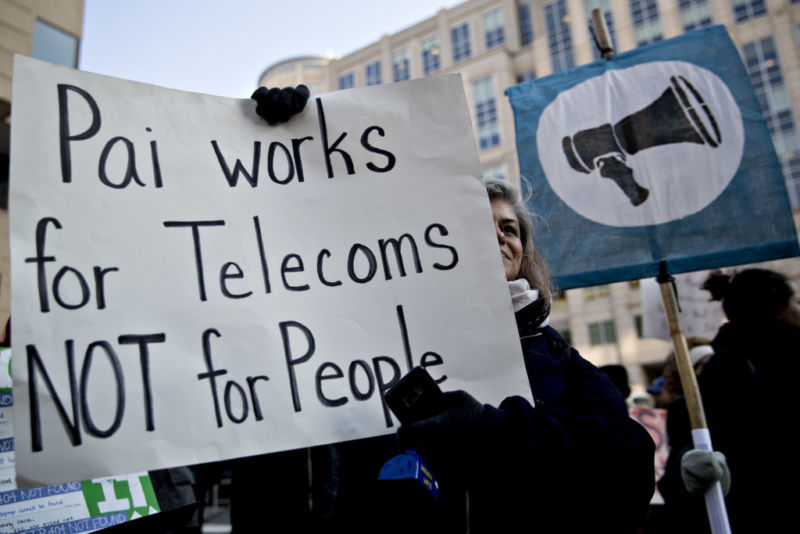
The legislatures in more than half of US states have pending legislation that would enforce net neutrality, according to a new roundup by advocacy group Free Press. So far, the states that have taken final action have done so through executive orders issued by their governors. Those are Vermont, Hawaii, Montana, New Jersey, and New York.
The legislative process obviously takes longer and is more uncertain because it requires votes by state lawmakers in addition to a governor's signature. Many bills are submitted in state legislatures without ever coming to a vote. But it wouldn't be surprising if some states impose net neutrality laws through the legislative process. The Washington State House of Representatives approved net neutrality rules by a vote of 93-5 on Wednesday, pushing the bill along to the state's Senate. In California, the state Senate passed a net neutrality bill last month.
The 27 states with pending legislation are Alaska, California, Colorado, Connecticut, Delaware, Georgia, Hawaii, Illinois, Iowa, Kansas, Maryland, Massachusetts, Minnesota, Nebraska, New Jersey, New Mexico, New York, North Carolina, Oregon, Pennsylvania, Rhode Island, South Dakota, Tennessee, Vermont, Virginia, Washington, and Wisconsin. Free Press has links to the pending bills or articles about the pending bills in nearly all of these states. (Free Press listed 26 states with legislation but we found out after this article published that Kansas also has pending net neutrality legislation, bringing the total to 27.)
"In the eight weeks since the FCC voted to take away net neutrality, a groundswell of activism by local advocates and politicians has revived prospects for lasting open-Internet safeguards," Free Press strategy director Timothy Karr wrote.
Multiple approaches to net neutrality
The potential role of states in regulating net neutrality is uncertain. The Federal Communications Commission repealed its own net neutrality rules and is attempting to preempt state and local laws that regulate net neutrality.
The executive orders from Vermont, Hawaii, Montana, New Jersey, and New York require ISPs to follow net neutrality principles if they sell Internet service to state agencies. Vermont's governor was the latest to sign such an order, doing so yesterday. Instead of imposing net neutrality restrictions on all Internet providers, these states are using their status as buyers of Internet service to protect net neutrality.
"Through the order, the State of Montana acts as a consumer—not a regulator," Montana Governor Steve Bullock said. "Because there's no mandate, and no new regulations, there's certainly no federal preemption. Companies that don't like Montana's proposed contract terms don't have to do business with the State."
Some legislative attempts, such as this Rhode Island bill, also use the approach of enforcing net neutrality through the state procurement process. But others would go beyond that by imposing net neutrality rules on all ISPs regardless of whether they contract with state agencies. The bill that passed the California Senate would essentially replicate the FCC's repealed prohibitions on blocking, throttling, and paid prioritization, for example.
Possible legal roadblocks
The Electronic Frontier Foundation is worried that the California Senate approach is likely to be thrown out of court when ISPs sue to overturn the rules. States are more likely to survive legal challenges if they use indirect approaches, such as requiring recipients of state funding to abide by net neutrality, the EFF argues.
But Harold Feld, a telecom lawyer and senior VP of consumer advocacy group Public Knowledge, argues that states can pass their own net neutrality laws.
The FCC decided in its net neutrality repeal "that Congress withheld authority over broadband from the FCC," Feld wrote. "If Congress explicitly withheld authority over broadband from the FCC, it withheld from the FCC the power to preempt any 'contrary' state authority."
One thing net neutrality advocates agree on is that reinstating the FCC rules in full would work better than a state-by-state approach. The attorneys general from 22 states and the District of Columbia have sued the FCC to reverse the net neutrality repeal and preemption of state and local laws. Separately, Democrats in Congress are trying to push through a vote to reinstate the FCC rules.
There have also been municipal efforts, such as San Francisco requiring net neutrality protections in a potential city-wide fiber network.
"It's important to have action across the map," Free Press wrote. "City and state protections are encouraging, and would likely withstand legal challenges from the phone and cable lobby, but they offer only a piecemeal solution to a national problem. If we're to protect net neutrality for everyone we must restore the Title II standard of the FCC's 2015 Open Internet Order."
reader comments
72